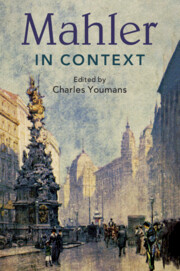Book contents
- Mahler in Context
- Composers in Context
- Mahler in Context
- Copyright page
- Dedication
- Contents
- Figures
- Music Examples
- Notes on Contributors
- Preface and Acknowledgments
- Abbreviations
- Part I Formation
- Part II Performance
- Part III Creation
- Part IV Mind, Body, Spirit
- Chapter 20 Organized Religion
- Chapter 21 German Idealism
- Chapter 22 Nietzsche
- Chapter 23 Fechner
- Chapter 24 Literary Enthusiasms
- Chapter 25 Romantic Relationships
- Chapter 26 Mahler and Death
- Part V Influence
- Further Reading
- Index
Chapter 23 - Fechner
from Part IV - Mind, Body, Spirit
Published online by Cambridge University Press: 18 December 2020
- Mahler in Context
- Composers in Context
- Mahler in Context
- Copyright page
- Dedication
- Contents
- Figures
- Music Examples
- Notes on Contributors
- Preface and Acknowledgments
- Abbreviations
- Part I Formation
- Part II Performance
- Part III Creation
- Part IV Mind, Body, Spirit
- Chapter 20 Organized Religion
- Chapter 21 German Idealism
- Chapter 22 Nietzsche
- Chapter 23 Fechner
- Chapter 24 Literary Enthusiasms
- Chapter 25 Romantic Relationships
- Chapter 26 Mahler and Death
- Part V Influence
- Further Reading
- Index
Summary
The physicist, psychophysicist, physician, and philosopher Gustav Theodor Fechner – an intellectual force occupying Mahler from his student years in Vienna through the composition of Das Lied von der Erde – is often described as a “mystic” or a “speculative thinker” whose fantastical philosophical system attempts to reconcile mechanistic science with an “animistic non-rational world-view.” Accordingly, his theories are usually dismissed today as curiosities. But though Fechner’s views may appear strange, on closer examination they are not mere arbitrary convictions; rather, they have a rational foundation. Furthermore, it can be demonstrated that Fechner, unorthodox thoughts notwithstanding, made important contributions to the natural sciences: particularly in the notions of “psychophysical parallelism” of the “day view,” a response to contemporaneous materialist and mechanistic orientations. The basic details of these Fechnerian ideas are presented here, along with an account of his early reception.
- Type
- Chapter
- Information
- Mahler in Context , pp. 198 - 206Publisher: Cambridge University PressPrint publication year: 2020

